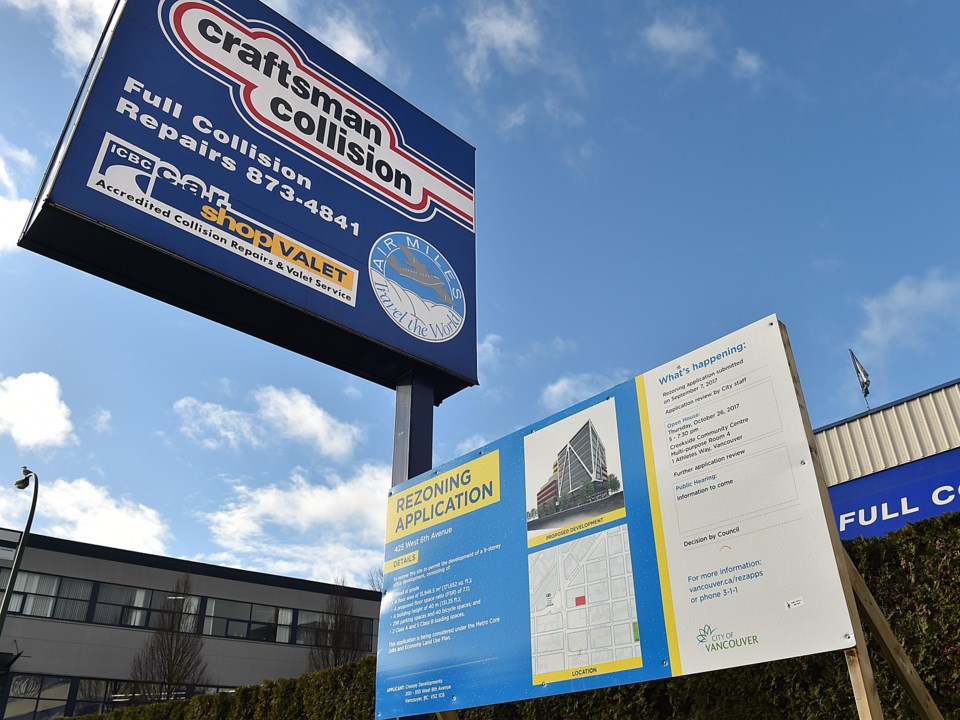Craftsman Collision is having to close its busiest shop in the Lower Mainland to make room for a nine-storey office tower.
“We’ve known for about two years and are shutting down the business at the end of June. It’s disappointing,” says Greg Hatswell, the general manager of real estate for Craftsman Group. His father, Bill, started the company in 1977 a block away from the soon-to-be closed body shop at Yukon Street and Sixth Avenue.
Cressy Developments plans to build an office tower across the street from 3 Vets, after the building was sold for $20.4 million.
Craftsman Collision could not find another location so it’s moving its customer base to its existing locations on Powell Street, Main Street and Cambie at Southwest Marine Drive. The latter location, right next to the boundary with Richmond, is expanding.
The move speaks to the in a city with skyrocketing real estate prices.
Hatswell says the property at 425 West Sixth Ave. is assessed for its “highest and best use.” In other words, instead of basing the value of the property on its current use, B.C. Assessment is assessing it as bare land with development potential — such as a nine-storey office tower.
“I’ve taken B.C. Assessment to battle on this and tried to keep our property taxes down and lost the battle more than once,” Hatswell says.
Craftsman Collision owns one-third of its shop buildings, but not the three in Vancouver. On the properties it leases, Craftsman Collision, not the building owner, must pay rising property taxes, which are now at about 80 per cent of the annual lease payments.
Craftsman Collision’s industrial/commercial zoning had been grandfathered in but it’s next to impossible to find industrial space in the city, Hatswell says. “. There is no local replacement. There are no buildings that suit vehicle repairs.”
Business in Vancouver reported in mid-December that Metro Â鶹´«Ă˝Ół»has Canada’s second-lowest industrial vacancy rate (behind Toronto), at 1.7 per cent. Industrial lease rates increased 12 per cent over 2016 numbers, the highest increase in three decades, to an average of just under $10 per square foot. Â鶹´«Ă˝Ół»industrial strata prices are hitting $700 per square foot.
Hatswell tried to broach the idea of having a body shop on the ground floor of an office or residential tower but was turned down. “We don’t use solvent-based products any more and fumes are next to nothing [under current guidelines],” he says. “It wouldn’t and shouldn’t be impossible for the city to allow this.
“Even if a developer were to include us, however, a developer will want significantly higher rent than we could afford to pay. We’re being pushed out of the core of the city.”
What’s happening in the core will soon spread outwards to other areas such as Clark Drive and Powell Street, he says. As those pressures mount, he can foresee a day when cars are dropped off at a shop in Â鶹´«Ă˝Ół»and then trucked to a shop in the Fraser Valley to be repaired.
“As a business, we’re still growing. We’re not losing our ability to service the market,” says Hatswell. “When we lose some options, we come up with other options.”
Of course, this means customers will also have to drive farther to drop their car off at a body shop, just like they have to . “I don’t expect Craftsman Collision will lose a high proportion of customers,” he says. “People have brand loyalty and will go a few kilometres out of the way. Plus, there aren’t many shops in the centre of Â鶹´«Ă˝Ół»anyway. It’s becoming a matter of fact.”



